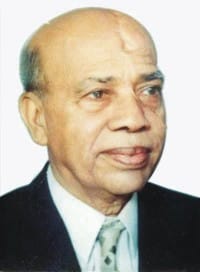Reminiscing Osman Ghani Khan

Osman Ghani Khan
SOON after the liberation of Bangladesh and Bangabandhu Sheikh Mujibur Rahman's return from prison in Pakistan, he appointed my father Late Osman Ghani Khan as the first Secretary of the Ministry of Defence in 1972. It was a time when vital issues remained to be resolved and the tasks ahead for the new defence secretary were critical.
The first priority was to set up the Ministry of Defence. Mr. Khan made significant contribution in planning and setting it up, almost single handedly, essentially from scratch.
It was a tremendous challenge my father rose up magnificently to. I remember him working very hard to establish the armed forces necessary. The support and cooperation he received from General M.A.G Osmany deserves a special mention too.
Initially, Mr. Khan was assisted by Dr. Towfique-e-Elahi Chowdhury, Bir Bikram and Mr. Mahbub Ahmed, who were working as Deputy Secretaries in the Ministry at that time. I vividly remember the time when my father's friend, late Syed Hossain, who was the then Additional Secretary of the Ministry of Establishment, came to our house one evening and offered him two alternative options to set up the office of the ministry, one of which was the old High Court Building. My father's preferred choice was the old High Court Building. The Old High Court premises still bears the memory of those days through two majestic trees whose saplings were planted by Bangabandhu and my father.
My father and General Osmany were very good friends since early days in their respective careers. They made a perfect team until General Osmany resigned as the C-in-C of the armed forces to become a Minister in Bangabandhu's cabinet.
My father broached the idea with Prime Minister Bangabandhu Sheikh Mujibur Rahman that the government should promote him to the rank of a full General as a mark of tribute of his services to the war of liberation. As was to be expected, Bangabandhu was very pleased with the idea.
Bangabandhu had an immense liking for my father for his courageous initiatives. It was my father who persuaded Prime Minister and Defence Minister Bangabandhu Sheikh Mujibur Rahman of the strategic importance in a democratic set-up of having the Director of Forces Intelligence (presently DGFI) and the Inter Services Public Relations (ISPR) directly under civilian control in the Ministry of Defence.
As the Defence Secretary, Late Mr. Khan was also assigned the crucial responsibility of leading the Bangladesh delegation for official talks on vital bilateral issues with India such as the withdrawal of the Indian army from Bangladesh, return of weapons and ammunition captured from the Pakistan army by the Indian army, etc.
I remember the frustrations of my father when after three days of lengthy discussions at the Old High Court Building, the talks remained inconclusive and reached a stalemate. Bangabandhu finally advised him to discontinue the discussions, and told him that he would personally take up the contentious issues directly with the then Indian Prime Minister, Late Indira Gandhi.
Soon thereafter, the Indian army organised a parade in the Dhaka stadium to bid farewell before leaving the soil of Bangladesh. Later on, he led another delegation to India for bilateral discussions with his Indian counterpart.
He also led the first Bangladesh delegation to Moscow as the Defence Secretary to negotiate a deal for MIG -21 fighter planes, which were given free of cost by Russia to form the air force of independent Bangladesh.
Late Osman Ghani Khan also contested the elections after his retirement from the constitutional position of Comptroller and Auditor General of Bangladesh. He was elected a Member of the Fifth Parliament, after winning an overwhelming majority from Pabna 2 constituency in 1991, and appointed a Minister for the Ministry of Establishment.
While holding the constitutional position of Comptroller and Auditor General, Osman Ghani Khan played a crucial role in getting Bangladesh elected by the United Nations General Assembly as a member of the United Nations Board of Auditors during 1980 1982. He served as Chairman and a Member of the United Nations Board of Auditors for two successive terms.
Late Mr. Khan became a prolific writer after his retirement, focusing on issues of development and good governance. Quite often, the writings and deliberations of Mr. Khan provided cautionary notes on flawed policy, which indeed emerged as stumbling blocks in the bureaucracy in later years. He never faltered to pronounce what he felt was right and the truth.
He deliberated on reducing defence expenditure to enhance development funds; he pointed to the need for downsizing the administrative bureaucracy; he warned of the consequences of unfettered promotions where posts were limited in the government; he analysed annual budgets and criticised lax financial discipline, stressing on the importance of expenditure control.
Osman Ghani Khan passed away on April 26, 2000 at Mount Elizabeth Hospital in Singapore at the age of 77 years. Today, with deep respect, we remember him and the imprint he left behind in his work, writings and ideology.

 For all latest news, follow The Daily Star's Google News channel.
For all latest news, follow The Daily Star's Google News channel. 



Comments